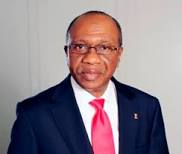
On June 3, 2016, Godwin Emefiele, the Governor of the Central Bank attained his second anniversary in office. This is a tenure which has been hallmarked so far with the struggle to maintain the foreign exchange reserves, stabilise the rate of exchange of the Naira against the background of dwindling reserves as a result of persistent softness of the oil market and sustained speculative attacks. He also confronted political headwinds arising from the outcome of elections, the outcome of which has been more challenging because he had been appointed by the outgoing administration and was targeted by politicians who consider politics a do or die affair for which the spoils belong to the winners.
Governor Emefiele, as part of the Agenda for the Central Bank which he rolled out during his maiden world press conference just after his assumption of office on June 5, 2014, gave assurance of his determination to keep fidelity to his core mandate as the Governor; that is the maintenance of price and exchange rate stability, promised to work assiduously for the gradual but steady reduction on the prevalent level of interest rates, target accretion to the foreign exchange reserves while declaring his disavowal to currency devaluation in the prevalent circumstances of the economy and asserted that he would run a Central Bank that is apolitical, professional and people oriented
But the reality is that issues surrounding the depleting reserves and the management of the exchange rates have made priority claims on the attention of the governor almost making him neglect other also important issues which he outlined in the agenda under reference. When the governor came on board, the challenge of the falling oil price and, therefore, dwindling reserves was already with us and there has been no let up. Instead the situation had deteriorated that under the governor’s watch the rate of exchange first moved from N155 to N168 after which the Dutch auction system was abolished and the interbank market was introduced at the rate of N198 and, therefore, despite the governor’s well-advertised disavowal to devaluation, he had no option but to allow the currency to devalue under his watch.
And since the received wisdom is that the pegging of the Naira has accounted for the general contraction of the economy which has resulted to the economy witnessing negative growth rate in the first quarter of 2016 for the first time in about two decades, the Monetary Policy Committee had no option but to mandate the Central Bank to inject some flexibility into the determination of the rate of exchange. But flexibility in the determination of exchange rate is clear euphemism for devaluation. It is, therefore, difficult to envisage how the Central Bank can navigate this obstacle in the face of the clear opposition by the President for reasons that are historically correct to devaluation.
All concerned are now waiting with bated breath for the details of this promised relaxation of the determination of exchange rate with the fervent prayers that it would herald the much touted inflow of foreign exchange into the economy from autonomous sources, kick start productivity, reduce unemployment, mitigate rising inflationary pressures and allow critical stakeholders to reclaim their independence from the strangle hold of exchange rate management pressures.
The Central Bank has advisedly keyed into the promotion of credit to the MMSEs as a veritable platform for the promotion of growth in the economy by making available the N220 billion targeted fund. To contextualise this observation, a study conducted by the National Bureau of Statistics in 2010 highlighted the fact that at that time there were 17.2 million MMSEs in the country employing about 32 million people. And if this sector is given a boost so that each of these businesses employs just one additional person we would automatically be adding about 17 million jobs which would certainly make a whopping dent on the prevalent unemployment situation in the country.
The Central Bank recently upped the ante by introducing the Anchor borrowers’ scheme which was launched by President Muhammadu Buhari at Kebbi State which had since been extended to other states of the Federation aimed to achieve a viable agricultural base for the country with more integrated value chain to enhance food security, reduce imports and enhance productivity and, therefore, employment.#
The other major development which is noteworthy is the introduction by the Central Bank in conjunction with the Bankers’ Committee on February 14, 2014 of the biometric based unique Bank Verification Number (BVN) aimed at giving a boost to the effectiveness of the Know Your Customer principle on the part of the banks. This scheme is targeted at customer protection and for attaining growth in the volume of credit by addressing frontally issues relating to identity theft and generally offer protection to the banks through a reduction in the incidents of bank frauds.
It is also noteworthy that the Federal Government recently leveraged on this scheme to exhume a number of ghost workers in its employment! We commend the governor for his level headedness, his focus and for the avoidance of all manner of controversies as he continues to grapple with the challenging task of piloting monetary policy in the prevailing excruciating circumstances in the country.

No comments:
Post a Comment